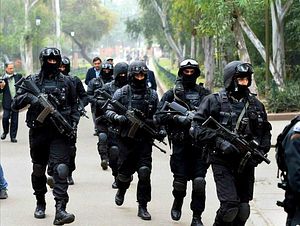Terrorism is best defined as an operational technique which involves the use or the threat of using violence to deliver a message to a wider target audience. The January 3 Pathankot attack on a base of the Western Air Command of the Indian Air Force, resulting in the deaths of seven security forces personnel and six attackers, is a classic example of terror acting as a spoiler for diplomatic initiatives
Firstly, the timing of the attack is significant. It comes in the wake of Prime Minister Narendra Modi’s visit to Lahore after previously addressing the Afghan parliament and striking a mammoth defense deal with Russia. His visit was viewed as a possible ice breaker for both governments, which could put tensions from 2015, such as line-of-control (LOC) skirmishes and the cancellation of NSA level talks, behind them.
Given that senior BJP officials have been more nuanced in their bashing of Pakistan after the event, it is clear that there is a realization that this attack was aimed at ensuring that prospects for bilateral cooperation do not materialize between the BJP government and the PML-N government in Pakistan.
Jaish-e-Muhammad (JEM), the perpetrators of the attack, are Kashmir-centric in their approach and the organization cites Kashmir’s integration into Pakistan and atrocities committed by Indian forces in the territory as a justification for its targeting of institutions that carry symbolic significance for New Delhi. It is noteworthy that ever since the Modi-led National Democratic Alliance (NDA) government came into power, there have been attempts to abrogate Article 370 of the Indian constitution, which grants special status to Kashmir. In addition, LOC skirmishes as well as crackdowns against the Muslim population in Kashmir over the past year may have further motivated JEM to carry out the attack.
The political dimension of this attack is also important. The BJP government’s policy towards Kashmir has fomented discord and allowed for spoilers, such as the JEM, to target military institutions. On the other hand, Kashmir has been raised as a central issue in Pakistan’s foreign policy under the Pakistan Muslim League government. The Pakistani government’s inability to raise the Kashmir issue as a focal point in resuming dialogue with India is also a motivating factor for JEM’s attack on Indian military installations and hijacking potential avenues for dialogue.
If one examines the joint statement between Narendra Modi and Nawaz Sharif in Ufa, Russia last year, Pakistan does not draw special attention to Kashmir. As a result, Sharif was castigated by many analysts for not mentioning the dispute alongside “all outstanding issues.” Doing so had long been a cornerstone of Pakistan’s policy vis-à-vis India. Similarly, much was expected from Sharif, given his indomitable commitment to raising the Kashmir issue at multilateral forums such as the United Nations.
The Pathankot attack also lends credence to the argument that for Pakistan economic cooperation cannot be divorced from security concerns, such as the China-Pakistan Economic Corridor, the activities of the East Turkestan Islamic Movement, and the Balochistan Liberation Army’s activities. China’s repeated assertion that it trusts the Pakistan’s army’s commitment to defeat the East Turkestan Movement has allowed for CPEC to push on without fear. Trade between India and Pakistan, however, has been held hostage by trust deficits between the two sides and the activities of rogue elements that do not want amiable ties between the two countries. In part due to the economically friendly manifestos of the ruling political parties in both countries, militant groups want to hijack the relationship through violence and terror to make their presence felt despite their political insignificance.
The Pathankot incident thus serves as a reminder that while both Modi and Sharif can continue to talk about regional connectivity, the inability to silence rogue actors will continue to be a flash point between India and Pakistan. This is best exemplified by the fact that there are contrary narratives over Pakistan’s intentions, despite arresting members of JEM. These concerns may be well-placed given how previous efforts in putting the perpetrators of the Mumbai attacks on trial have so far proven to be futile.
If such encouraging signs do allay trust deficits over the issue of terrorism and bring both governments together to find common ground, that would be ideal. However, as we’ve seen, the overall prognosis of the bilateral is subject to the reactions of both governments and rogue actors, which wish to divide both India and Pakistan.
Hamzah Rifaat is a 2016 Visiting Fellow at the Stimson Center and has worked as a Freelancer for the Friday Times, a newsweekly based in Lahore, since November 2012.

































